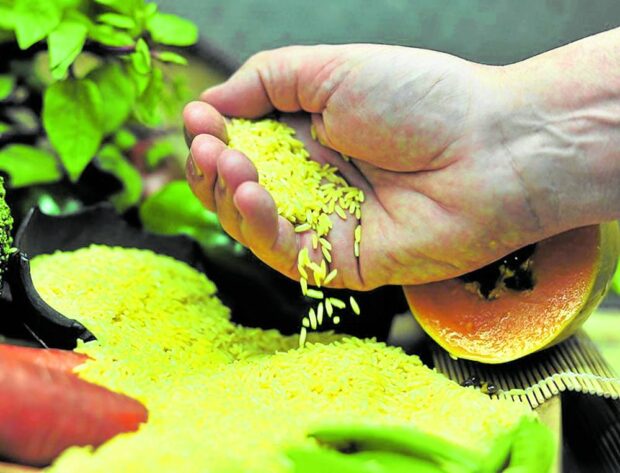Agri dep’t urged to take cue from SC ruling on genetically modified crops

GOLDEN OPTION The International Rice Research Institute (Irri) promoted the genetically enhanced rice “to handle a specific nutrition issue, without any additional cost or difference in
taste.” —IRRI PHOTO
The government should start reorganizing its agricultural and food priorities to promote the general health of Filipinos and pour support to farmers instead of pushing production of genetically modified crops whose benefits have not been proven, Greenpeace and Kilusang Magbubukid ng Pilipinas (KMP) said on Friday.
The Supreme Court earlier this week issued a writ of kalikasan, granting a petition filed by Magsasaka at Siyentipiko Para sa Pag-Unlad ng Agrikultura (Masipag) to stop the commercial release of genetically modified (GM) “Golden Rice” and “Bt eggplant.”
A writ of kalikasan is a legal remedy provided by the Constitution for the protection of the right to “a balanced and healthful ecology in accord with the rhythm and harmony of nature.” In a statement, Greenpeace said the Supreme Court’s decision was cheered by those “who have long opposed genetically modified crops and the harm they bring to people and the environment.”
“The high court’s decision echoes what we have been saying for years: that the involved companies and agencies have yet to show concrete evidence of any benefit these crops would bring to farmers and the Filipino people,” said Wilhelmina Pelegrina, strategy and analysis director of Greenpeace Southeast Asia.
READ: SC issues writ of Kalikasan vs genetically modified rice, eggplant
Article continues after this advertisementShe said the GM crop developers had not consulted communities and indigenous peoples who could be affected by these crops.
Article continues after this advertisementVitamin-enriched
The Golden Rice, patented by the transnational agrochemical corporation Syngenta, is a modified rice developed through genetic engineering that contains beta carotene (provitamin A).
The beta carotene in the modified rice was inserted with two new enzymes that are identical to the beta carotene found in green leafy and yellow-colored vegetables and orange-colored fruits.
The International Rice Research Institute (Irri) promoted genetically enhanced rice “to handle a specific nutrition issue, without any additional cost or difference in taste.”
It was referring to the vitamin A deficiency in the country and malnutrition among children.
Bt eggplant, meanwhile, was introduced by the company International Service for the Acquisition of Agri-Biotech Applications Inc.
The company said that the Bt eggplant contains a “natural protein” from the soil bacterium Bacillus thuringiensis, which makes it resistant to eggplant fruit and shoot borer (EFSB), considered to be the pest most destructive to eggplants.
The company had assured that the Bt protein only affects the EFSB worm and is safe for humans, farm animals, and even nontarget insects.
Contamination risk
Greenpeace had long opposed the release of these GM crops. The group has said that such crops could cause contamination through cross-pollination of other crops that are not genetically enhanced and may affect farmers’ markets, especially those of traditional and organic rice growers.
According to Greenpeace, GM crops are a threat to soil ecosystems as many of them secrete toxins against pests from the root into the soil. It said GM crops also are toxic to “nontarget” organisms, such as butterflies. Bt crops also affect insects that are important in natural pest control.
Pelegrina said that vitamin A deficiency can be resolved without the need for Golden Rice, but by ensuring Filipinos’ access to nutritious, healthy, and balanced diets.
“In the face of the climate emergency, we also need resilient food and farm systems grounded on ecological farming principles, rather than climate-harmful industrial agriculture,” Pelegrina pointed out.
KMP chair Danilo Ramos said that there were other crops that could address vitamin A deficiency, such as sweet potatoes (“kamote”), carrots, “malunggay,” squash, and tomatoes.
“If the proponents of the Golden Rice are serious about addressing vitamin A deficiency, they could support local farmers planting vegetable crops,” Ramos said in a statement.
Rethink priorities
Greenpeace urged the government, particularly the Department of Agriculture (DA), “to reorganize its priorities.”
“Instead of spending valuable resources promoting GM crops that would only serve corporate interests, the DA should fully support and promote ecological agriculture that works with and for farmers,” the group said.
Farmers have the most to gain and lose in a sector “that is already getting beaten up by a struggling economy and the worsening climate impacts,” Greenpeace said.
“It is the government’s duty to prioritize their concerns over the multinational agrochemical industry, and we’ll all be better for it,” the group said.
Gov’t duty
Golden Rice, also called yellow rice, was developed through genetic engineering using genes from corn and a common soil microorganism that together produce beta carotene in the rice grain.
Golden Rice was among the more than 80 GM crops that were either approved or in the process of getting a government clearance “for direct use as food and feed or for processing” since 2017.
The government allowed Bt corn to be produced commercially—the first genetically modified crop to obtain a permit.
Golden Rice was first developed in 1999 by Ingo Potrykus, a professor at the Swiss Federal Institute of Technology, and Peter Beyer of University of Freiburg, Germany, who began their research in 1982.
In 2004, the Golden Rice technology was donated to the Golden Rice Humanitarian Board, which transferred it to developing countries where vitamin A deficiency is prevalent, including the Philippines.
The Philippine Rice Research Institute is leading the development of Golden Rice in the country in partnership with Irri.
—WITH A REPORT FROM INQUIRER RESEARCH
RELATED STORIES